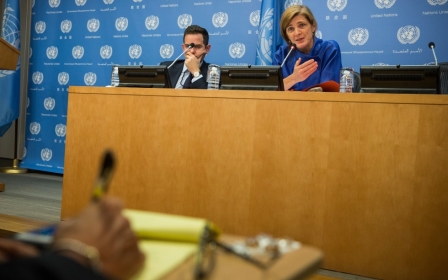US calls for international coalition to 'destroy' IS

The United States on Friday called for the creation of a broad international coalition against Islamic State (IS) in Iraq and Syria by the time of the UN General Assembly later this month.
"There is no time to waste in building a broad international coalition to degrade and, ultimately, to destroy the threat posed by ISIL," Secretary of State John Kerry and Defence Secretary Chuck Hagel said in a joint statement.
Meanwhile, NATO leaders condemn the "barbaric and despicable acts" carried out by IS, British Prime Minister David Cameron said on Friday.
"We are united in condemnation of these barbaric and despicable acts... Their threats will only harden our resolve to stand up for our values," Cameron said on the second day of a NATO summit.
Western powers on Friday discussed the emerging threat from IS, on the second day of a NATO summit dominated so far by the actions of their old foe Russia over Ukraine.
The US is trying to build up a "coalition of the willing" to take on militants and the talks brought together foreign ministers from 10 countries: Australia, Britain, Canada, Denmark, France, Germany, Italy, Poland, Turkey and the United States.
The issue of how allies can act dominated the leaders' working dinner at Cardiff Castle in Wales on Thursday night.
"Everyone agreed there should be a global response," a French diplomatic source said.
The source said French President Francois Hollande told fellow leaders they should be "ready to tackle all aspects of the struggle against IS, including the military one but also working with neighbouring countries on the issue of foreign fighters."
The United States has conducted air strikes against IS in northern Iraq, while Germany has agreed to arm the Kurdish forces battling the militants and Britain is actively considering a similar move.
NATO Secretary General Anders Fogh Rasmussen said Thursday that the international community had an obligation to stop the advance of IS and any request for help from the Iraqi government would be taken "seriously".
Cameron used the NATO dinner to urge allies not to pay ransoms for captives held by terror groups, amid reports that hostages from France and Italy have been released following the payment of large sums.
He said such payments were "deeply regrettable" and "utterly self-defeating", warning that the money was used for weapons, training and more threats.
In talks on the sidelines of the meeting, Obama and Cameron discussed the "broad strategy" on Iraq rather than specific action, and the need for a unifying government to emerge in Baghdad, British officials said.
Media reports suggest Cameron's Conservative party is sounding out lawmakers on whether they would back military action.
"I'm certainly not ruling anything out and I will always act in the British national interest," Cameron said.
But he added later: "What it needs is a fully-formed strategy to squeeze this from every angle. That is what you are getting from this conference."
Stay informed with MEE's newsletters
Sign up to get the latest alerts, insights and analysis, starting with Turkey Unpacked
Middle East Eye delivers independent and unrivalled coverage and analysis of the Middle East, North Africa and beyond. To learn more about republishing this content and the associated fees, please fill out this form. More about MEE can be found here.




